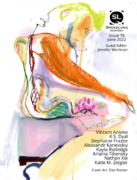The lies in each section of “3 Kinds of Lies” begin with generic abstractions. Then, in a blink, the lies become more particular. The shift is so rapid, it’s jarring—in a good way. Something about this abrupt shift out of the abstract into the concrete and personal makes me think of hypnotism, as if the act of listing these generic lies puts the speaker into a trance state in which the more personal lies surface. At the same time, there’s a kind of resistance in that first section. As the lies approach the subject of the speaker’s father, the speaker seems to pivot away from him slightly to less prickly details—the dome of the capital, for instance—before pivoting back to him. How would you describe the shifts and patterns in the lies told in this story? How were you thinking about the structure and movement of these lies?
I think it felt natural to me to tell an estrangement story through lies. Estrangement is a kind of lie; the person carries a title that should make them important to you, yet the relationship in practice is more complicated and formal. There’s so much beneath the surface that never seems to come out right in explaining the relationship to others; out of any type of relationship, it leaves the most room for judgment and misunderstanding. In starting each section with broader lies, I wanted to trigger a recognition in the reader of the ways we all cultivate public and private-facing personas. We are all actively involved in the business of decodifying our emotional landscapes for other people. Sometimes we’re simplistic about it because the truth is complex and painful; our lies are not always malicious. I wanted the reader to feel a culpability with the narrator from the beginning so that by the time more specific lies came into the story, empathy could transition into the space of that difficult relationship where it so often, in real life, doesn’t.
One of my favorite moments in this story is the line, “I was never ashamed of him.” Such a simple little sentence, yet it speaks volumes, and it breaks my heart. Also, I love it when characters reveal themselves through negative statements (not, never), which is what this story kind of is from start to finish. Is this a technique you use in other stories, too?
I don’t know that the statements are always negative, but I do have a bit of a flair for the dramatic—an affinity for revealing character through definitive statements. I love a strong narrative voice, a character who is unafraid to tell us, on their own terms, the way things are. One pattern in the stories I gravitate toward and write is that the core tension is often internal—between a single character and their beliefs about the world—rather than external—between two characters, or a character and circumstance. I love fiction that forces us to challenge our extreme emotions and judgments, that insists we don’t have the full story yet, finds the consequences of what we think we believe—you could call this the Crime and Punishment theory, I guess. This story is interesting because the framework of lying implies that the speaker already knows, in some sense, that what she tells herself, and others, isn’t the whole truth, which is another aspect to our most rigid beliefs—sometimes the belief itself is a projection.
Was this a list story from the start or did it take on this form through revision?
I began with the list format in mind. I first wrote this story as a flash fiction assignment for workshop with Wilton Barnhardt during the final semester of my MFA. After spending two years almost entirely immersed in a novel manuscript, switching back into the flash headspace felt very daunting. It seemed like the only way I could get myself to start was to come at it from an experimental angle. I had just read Kathy Fish’s incredible piece “3 Likely Stories” in The Forge, and the idea of structuring a flash piece as a triptych kept running around in my head. At the same time, I was taking a hybrid forms class with Eduardo C. Corral, and thinking about how to craft narrative outside of the boundaries of a traditional scene. Put it all together, and you get “3 Kinds of Lies,” I guess!
Is there something about giraffes that makes them a particularly apt choice for the partnerless animal in your story? Did you consider any other animals?
I wish I had a more artistic answer. If I’m being completely honest, I think it was the first zoo animal I thought of. There is something particularly endearing about giraffes, isn’t there? A partnerless ostrich just wouldn’t be the same.
What lie about the craft of writing fiction do you find most irksome or damaging or annoying?
Ooo, that’s so hard! Mostly because I think most lies about fiction are true—or at least necessary—at different points to different writers. “Write every day” keeps many people from writing at all, and it is simultaneously the only way I’ve ever been able to maintain momentum as a writer. I’m afraid to make generalizations. I’ll say this: The lie about fiction that has been most damaging to me personally is the lie that I am “not yet a real writer,” and that at some point, either through an academic job or publications or by somehow stringing together enough days of writing in a row, I will solidify my status enough to stop having to chase legitimacy as an artist. That lie is so damaging because it keeps me focused on the parts of the writing life that having nothing to do with sitting down and putting words on the page. I think the poet Marge Piercy said it best—“Work is its own cure. You have to / like it better than being loved.”



 The core workshop of SmokeLong Fitness is all in writing, so you can take part from anywhere at anytime. We are excited about creating a supportive, consistent and structured environment for flash writers to work on their craft in a community. We are thrilled and proud to say that our workshop participants have won, placed, or been listed in every major flash competition. Community works.
The core workshop of SmokeLong Fitness is all in writing, so you can take part from anywhere at anytime. We are excited about creating a supportive, consistent and structured environment for flash writers to work on their craft in a community. We are thrilled and proud to say that our workshop participants have won, placed, or been listed in every major flash competition. Community works.